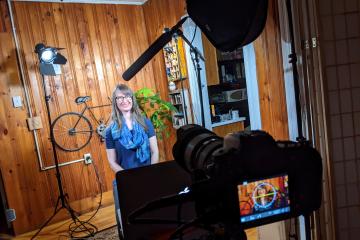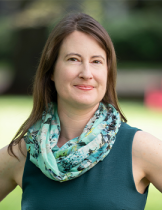
Get to know J-PAL North America’s co-executive directors

Laura Feeney and Vincent Quan discuss their backgrounds before coming to J-PAL North America, how they plan to work together as co-executive directors, and their top priorities in 2022.
What first brought you to J-PAL North America?
Laura: Before J-PAL, I worked for a few years in international development with a smaller nonprofit in Honduras and then at Innovations for Poverty Action. Through those experiences, I started to realize how important context is to implementing a good research project or interpreting study results. That, combined with a strong interest in domestic policy and poverty alleviation, led me to shift my focus to North America, and particularly the United States. While there are still wide gaps between my personal experience and the communities we’re working with, I have much more of an understanding of the context, and there are fewer degrees of separation than in international development. So that’s part of what brought me here.
I was also attracted to J-PAL’s mission of evidence-based policymaking, because I fundamentally like to understand, quantitatively, whether policies work and the size of their impacts. I have a memory from a graduate course I audited of doing a practice pitch to legislators of a policy you’d like to implement. Most people’s appeal was based on describing the need or challenge, or an emotional appeal. But what I wanted to hear was: Why pick this solution over another one–what impact will it have, and how does that compare to other potential solutions? Is it cost effective compared with other approaches? What evidence is out there and where are there gaps? J-PAL’s commitment to these questions makes it a natural fit for someone like me.
Vincent: I started my career focused on social justice issues. I started working on criminal justice reform at the Prison Law Office, and I then moved on to provide direct services at the Legal Aid Society in New York city, helping low-income New Yorkers deal with legal cases. Doing this work, I started to realize that, despite a lot of my best efforts and persistence, the problems that low-income populations faced were systemic in nature.
That prompted me to go back to graduate school to study public policy and focus on change at that systemic level. It was in graduate school that I learned about J-PAL and the randomized controlled trial (RCT) evaluation methodology. I was interested in using that methodology in US-focused work, because that’s where my passion lies and where my experience was. So, when a position for policy manager at J-PAL North America came up, I jumped at the opportunity.
J-PAL North America was an exciting opportunity for me to understand if the services that I had provided when I worked in direct service actually made a difference to improve people’s lives. There is also a part of me that was drawn to the quantitative aspects of social science research. Evidence-based policy is an opportunity for me to blend my intellectual curiosity with my passion to make the world a better place through effective social programs and policies.
How will you work together as co-executive directors to further J-PAL North America's mission?
Laura: We're going to fight to the death over every decision. And I'll win.
Vincent: It should be noted that Laura has a long history of practicing martial arts, and she once dragged me along to a boxing class.
Laura: In all seriousness, Vincent and I have worked together for a long time at J-PAL and we’ve collaborated on various projects. We have an excellent working relationship and a close friendship—we’ve camped in New Hampshire and hiked in Europe together. We’re both excited to have the opportunity to work together closely and bounce ideas off each other. Having different perspectives at the senior leadership level makes us stronger and better at our work.
Vincent: I agree, I’m personally very excited for this new Co-ED model. It places equal importance both on our research and policy work, because we’re fundamentally an organization that does both. Moving forward, I’m taking the lead on ensuring that the research and evidence that comes out of J-PAL North America is influencing policy and leading partnership building. I’ll also work closely with our training team to leverage training activities to advance our policy goals and to build the capacity of state and local governments to be able to generate and utilize evidence.
Laura: I’ll be spearheading a lot of our research operations and continuing to elevate the standard of how RCTs are done in the field and how rigorous research should be generated. This will also include expanding programs such as Research Management Support and the Economics Transformation Project. I’ll also be leading internal facing operations and ensuring that J-PAL North America continues to be efficient and effective.
Finally, what are the top priorities for you this year?
Vincent: The opportunity for J-PAL North America to help state and local governments leverage the American Rescue Plan is very exciting to me. This is an unprecedented amount of funding that is coming from the federal level to state and local governments to try new solutions and generate a wealth of knowledge around what actually works. If J-PAL North America can position ourselves as a thought and evaluation partner to state and local governments, we can drum up exciting research that can address long standing challenges in our country, such as inequality, poverty, and major racial disparities.
I’m also looking forward to scaling-up evidence-based programs. In 2021, we were excited to see that evidence informed legislation to expand tutoring in California and in Colorado. This year, we plan on deepening that work and ensuring that evidence is actually being used by policymakers to expand evidence based programs. For example, we’re promoting the evidence around summer youth employment programs, given the many benefits of these programs for low-income youth.
Laura: I’m very excited that we’re gaining more momentum in our evidence-building in homelessness and housing stability. We’re working with six partners in the Bay Area to look at cash transfer programs and what effect that can have on reducing or preventing homelessness. We’re also funding and providing research management support to related studies, such as a study on landlord engagement.
Another incredibly important bucket of work is advancing racial equity through both our programs and our internal workings. This is manifesting itself in a couple of ways. One is the Economics Transformation Project, which is trying to increase diversity and inclusion in the economics profession by targeting high schoolers and up. Another is helping researchers conduct research projects in a way that recognizes the systemic racism that may be exacerbating or underlying some of the issues being studied, and to help them ensure the research itself is not contributing even further to racial inequality.



